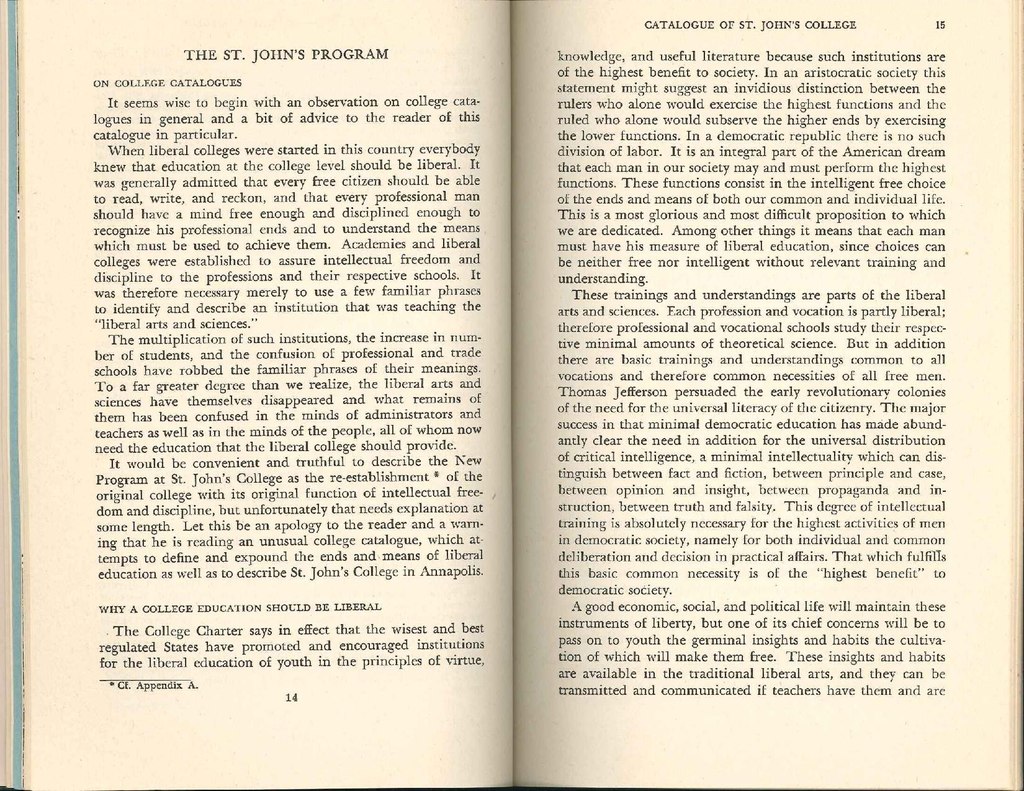on college catalogues
It seems wise to begin with an observation on college catalogues in general and a bit of advice to the reader of this catalogue in particular.
When liberal colleges were started in this country everybody knew that education at the college level should be liberal. It was generally admitted that every free citizen should be able to read, write, and reckon, and that every professional man should have a mind free enough and disciplined enough to recognize his professional ends and to understand the means which must be used to achieve them. Academies and liberal colleges were established to assure intellectual freedom and discipline to the professions and their respective schools. It was therefore necessary merely to use a few familiar phrases to identify and describe an institution that was teaching the "liberal arts and sciences."
The multiplication of such institutions, the increase in number of students, and the confusion of professional and trade schools have robbed the familiar phrases of their meanings. To a far greater degree than we realize, the liberal arts and sciences have themselves disappeared and what remains of them has been confused in the minds of administrators and teachers as well as in the minds of the people, all of whom now need the education that the liberal college should provide.
It would be convenient and truthful to describe the New Program at St. John's College as the re-establishment[1] of the original college with its original function of intellectual freedom and discipline, but unfortunately that needs explanation at some length. Let this be an apology to the reader and a warning that he is reading an unusual college catalogue, which attempts to define and expound the ends and means of liberal education as well as to describe St. John's College in Annapolis.
why a college education should be liberal
The College Charter says in effect that the wisest and best regulated States have promoted and encouraged institutions for the liberal education of youth in the principles of virtue, knowledge, and useful literature because such institutions are of the highest benefit to society. In an aristocratic society this statement might suggest an invidious distinction between the rulers who alone would exercise the highest functions and the ruled who alone would subserve the higher ends by exercising the lower functions. In a democratic republic there is no such division of labor. It is an integral part of the American dream that each man in our society may and must perform the highest functions. These functions consist in the intelligent free choice of the ends and means of both our common and individual life. This is a most glorious and most difficult proposition to which we are dedicated. Among other things it means that each man must have his measure of liberal education, since choices can be neither free nor intelligent without relevant training and understanding.
These trainings and understandings are parts of the liberal arts and sciences. Each profession and vocation is partly liberal; therefore professional and vocational schools study their respective minimal amounts of theoretical science. But in addition there are basic trainings and understandings common to all vocations and therefore common necessities of all free men. Thomas Jefferson persuaded the early revolutionary colonies of the need for the universal literacy of the citizenry. The major success in that minimal democratic education has made abundantly clear the need in addition for the universal distribution of critical intelligence, a minimal intellectuality which can distinguish between fact and fiction, between principle and case, between opinion and insight, between propaganda and instruction, between truth and falsity. This degree of intellectual training is absolutely necessary for the highest activities of men in democratic society, namely for both individual and common deliberation and decision in practical affairs. That which fulfills this basic common necessity is of the "highest benefit" to democratic society.
A good economic, social, and political life will maintain these instruments of liberty, but one of its chief concerns will be to pass on to youth the germinal insights and habits the cultivation of which will make them free. These insights and habits are available in the traditional liberal arts, and they can be transmitted and communicated if teachers have them and are
- ↑ Cf. Appendix A.

